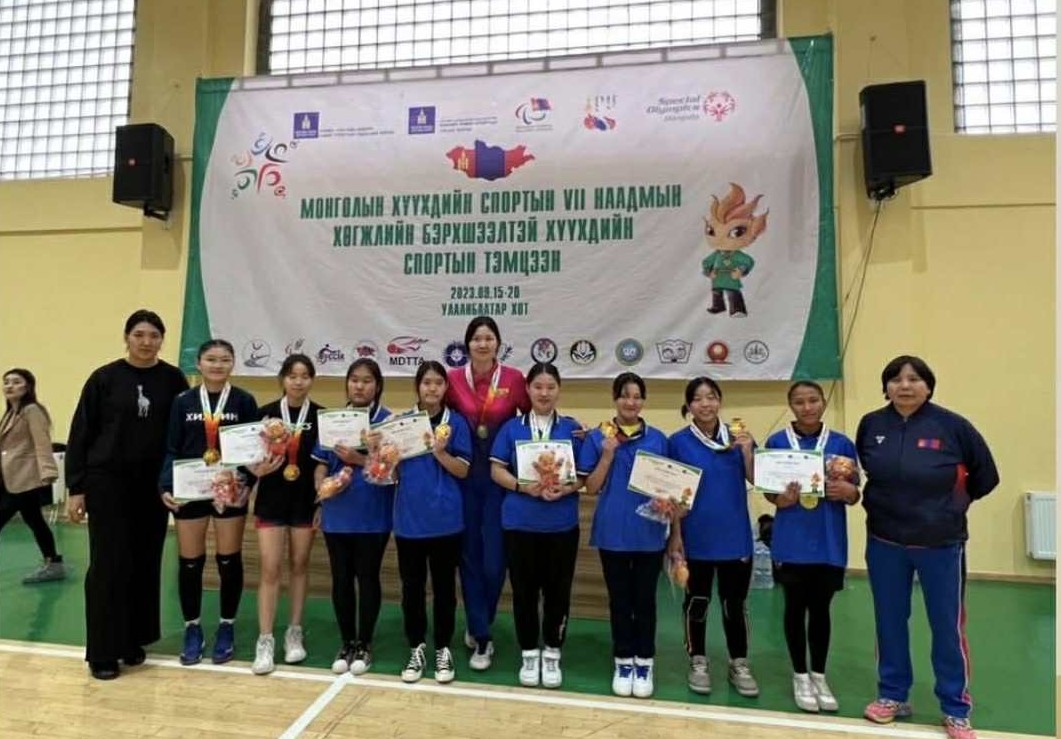Wife, mother of three, and former volleyball player, Naranchimeg Altangere, better known as Nara, is a physical education teacher and physical therapist at Special School 70, where she has been teaching and coaching for the past three years. Special School 70 is one of the four schools in Mongolia where 348 students with intellectual disabilities study. 22 of those students receive physiotherapy classes and more than 50 students are training in volleyball under Nara’s administration.
She has been training Unified volleyball teams as a coach since 2023 for the National Games’ volleyball competitions as well as attending the coaching program, organized by Special Olympics Mongolia.
When she was in middle school, she tried to join the volleyball class, but they didn’t let her because she was not as tall as they wanted. By the time she entered eighth grade, she had grown taller than most of the boys in her class and they let her play. That is when she started taking her volleyball career seriously. Although many clubs made offers for her 184 cm height, she chose to stay with her former club and continued her sporting career there at Inacore club.
Nara spent time this past week detailing her coaching journey and passion for learning as she prepares her team to compete next week in the Special Olympics Unified Volleyball World Cup in Katowice, Poland.
1. What is your background with volleyball?
I started playing volleyball when I was 15 years old. Since then, I have participated in many international competitions. I was a member of the Mongolian national volleyball team for five years and participated in international competitions.
Personal achievements include:
- In 2009, I participated in the Summer Universiade held in Belgrade.
- Won a bronze medal at the Asian University Volleyball Championship held in Thailand in 2009.
- Won a silver medal at the Asian University Volleyball Championship held in Mongolia in 2012.
- Won gold and silver medals in the Mongolian National Volleyball League.
2. What level of coach training have you received?
I am a teacher and coach, currently in my third year of teaching at a school for children with special needs. I have also participated for the past two years in the coaching training program organized by Special Olympics Mongolia.
3. How do you continue to improve your coaching ability?
I train children with special needs in volleyball and prepare my athletes to participate in domestic competitions. I also conduct volleyball training for children without intellectual disabilities. By watching videos of coaches from other countries and trying out new training methods, I continuously improve my coaching skills within Special Olympics.
4. How important is it for you to continue to learn as a coach?
As a coach, it is extremely important for me to continue learning. Sports science, training methods, and even athletes’ needs are always evolving. By constantly improving my knowledge and skills, I can provide the best possible support for my athletes, keep them motivated, and help them reach their full potential. Lifelong learning allows me not only to stay up to date with new techniques but also to grow personally and professionally.

6. Why did you decide you wanted to be a coach?
I am passionate about sports. My first teacher, mentor, and role model in volleyball was State Honored Teacher of Mongolia, Mrs. Solongo D., who has over 1,000 students in Volleyball and she is one of the main inspirations I wanted to be a volleyball coach.
Then as an athlete, I learned many valuable lessons about both life and sports from my coaches and senior teammates which propelled me to get my bachelor’s degree in physical education specializing in ball sports. This inspired me to help people who want to grow and improve. I also enjoy sharing my knowledge and skills with others.
7. What have you learned about yourself as a coach, working in SO?
Working in Special Olympics has taught me patience, empathy, and the value of focusing on each athlete’s individual strengths. I’ve learned that being a coach is not only about teaching skills but also about building confidence and celebrating progress, no matter how small. It has shown me that I need to be more flexible, creative, and positive, and that my role is as much about supporting personal growth as it is about developing sports performance.
8. Can you give an example of how you were able to help an athlete improve their performance beyond any medals they may have won in Special Olympics?
I have worked with volleyball athlete, Tsegtsmaral S., in this team for three years. At first, she was unstable and lacked self-confidence. I developed a training plan with small, manageable steps, focusing specifically on technique, foot positioning, and ball control. After two years, her performance improved from 30% to 50%, and not only did she achieve better results in competitions, but her self-confidence and teamwork skills also improved significantly.
